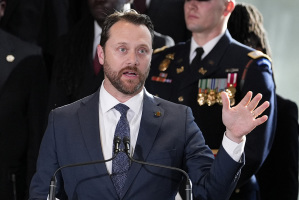New Mission Agency Chief Seeks Stronger Local-church Ties
NEW YORK -- As a United Methodist pastor, the Rev. R. Randy Day has spent much of his career working at the local church level.
Now, as the new chief executive of the denomination's largest agency, Day plans to make interaction with congregations a priority. The 55-year-old pastor, who took office Jan. 1, acknowledges that many church members already have a good understanding of mission, and he intends for the United Methodist Board of Global Ministries to "work even closer than it has with the local churches."
He promises better communications, continued dialogue with annual (regional) conferences and church partners, and new ways to reach people in the pews, particularly young adults and the recently retired, who he believes have many gifts to offer as volunteers for denominational programs and projects.
But Day's not just looking for donations of time. During a Jan. 7 interview, he told United Methodist News Service he would not be shy about challenging local churches and conferences to increase their financial support of board programs.
After suffering through staff layoffs and program cuts in the last two years, the Board of Global Ministries is faced with a tight 2003 budget. "The reality is we cannot increase that budget," he explained. "We've got to live within it."
Despite that limitation, the church's mission work will continue. And Day, who led the agency's efforts in evangelism and church growth and community and institutional ministries for the past two years, said he will take a pastoral approach to his meetings with church members and partners.
"It's an active listening," he explained. He is open to hearing "passions and dreams or disappointments" and discussing how to act on those dreams and concerns.
Day plans to maintain ties beyond the denomination as well, noting that he was educated in the ecumenical environments of Silliman University in the Philippines and Yale Divinity School. Many of the missionaries who influenced his early life were from other denominations, he said. As a member of the World Methodist Council's executive committee, he also is sensitive to maintaining good relations with other Methodist bodies.
During his years as a local pastor and district superintendent in the New York Annual (regional) Conference, Day gained a wider global perspective of mission through extensive travels and work in such countries as Mozambique, South Africa and the Philippines. He was actively involved in the denomination's fight against apartheid in South Africa and the worldwide movement to ban land mines, and he said racism will continue to be a personal and institutional concern.
In the coming year, the needs of Africa - and particularly sub-Saharan Africa - will command the agency's attention. "We have the continuing devastation of AIDS there, with a huge number of AIDS orphans," he pointed out.
A drought-induced famine also is a concern, just as it was in 1985 when Day made his first trip to that region. The United Methodist Council of Bishops issued a churchwide appeal in 2002 to help address the famine in Southern Africa.
The Korean peninsula, faced with the issues of nuclear threats, reunification and severe hunger, will remain a focus for the Board of Global Ministries. The agency also is teaming with Korean Methodists for mission work in other parts of Asia, such as Cambodia and Mongolia.
"We've had a historic role in peace talks in many parts of the world," Day added. "I want to continue that."
Day said he also is sensitive to countries not receiving much international attention, such as Haiti, "a place that seems to continue to unravel" under the pressure of poverty, hunger and illiteracy.
A father himself, Day is making the needs of children around the world a personal priority. "I have a hard time going through a day without thinking about some of the street kids I've seen in Manila and Rio de Janeiro and Port-au-Prince," he noted. Although he has been impressed by the programs for children that he has visited in United Methodist-related institutions, "the problem is there aren't enough institutions, enough churches, enough programs to get all kids off the streets."
By Linda Green





























